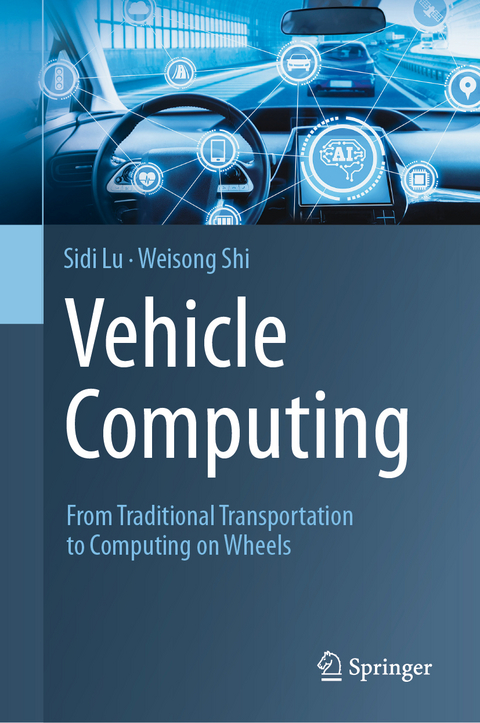
Vehicle Computing
Springer International Publishing (Verlag)
978-3-031-59962-0 (ISBN)
Over the past century, vehicles have predominantly functioned as a means of transportation. However, as vehicular computation and communication capacities continue to expand, it is anticipated that upcoming connected vehicle (CVs) will not only serve their conventional transport functions but also act as versatile mobile computing platforms. This book presents the concept of Vehicle Computing, encompassing five primary functionalities of CVs: computation, communication, energy management, sensing, and data storage. It proposes a potential business model and explores the challenges and opportunities associated with these domains.
Vehicle Computing serves as an important resource for the research community and practitioners in the field of edge computing and cyber physical system, capturing the essence of a rapidly changing industry, addressing the challenges and opportunities associated with connected vehicles (including software-defined vehicles, autonomous vehicles, electric vehicles), machine learning, communication, sensing, data storage, energy management, and computer systems. It synthesizes the latest research and real-world applications, offering valuable insights to both academia and industry professionals.
Vehicle Computing covers topics such as:
- The fundamentals of Vehicle Computing, including its historical context and key components.
- Advanced communication and networking technologies for connected vehicles.
- Sensing and data acquisition techniques, including edge and cloud computing integration.
- Energy management and storage, focusing on electric vehicle infrastructure and vehicle-to-grid.
- Data storage and processing strategies for vehicular environments.
- Business models, opportunities, and challenges associated with Vehicle Computing.
- Real-world applications and case studies, highlighting best practices and future trends.
Sidi Lu is an assistant professor of Computer Science at William & Mary. Her research interests broadly encompass edge computing, emerging mobility, and applied AI and data science, aimed at enhancing the reliability, scalability, security, and efficiency of networked, distributed, and autonomous systems. Her contributions have gained significant visibility within the university and the broader community. She has received prestigious awards, including the Ralph E. Kummler Award for Distinguished Achievement in Research and the Michael E. Conrad Research Award. Her work in vehicle computing has been highlighted in the Global Auto Mobility weekly newsletter, and her disk failure prediction software, along with the associated dataset, has been downloaded by researchers from over 200 institutions globally. Furthermore, she has established close collaborations with industry leaders, and her findings have been published in a range of top-tier conferences and journals. Weisong Shi is an Alumni Distinguished Professor and Chair of the Department of Computer and Information Sciences at the University of Delaware (UD), where he leads the Connected and Autonomous Research (CAR) Laboratory. He is an internationally renowned expert in edge computing, autonomous driving, and connected health. His pioneer paper, "Edge Computing: Vision and Challenges,” has been cited more than 7000 times. Before joining UD, he was a professor at Wayne State University (2002-2022). He served in multiple administrative roles, including Associate Dean for Research and Graduate Studies at the College of Engineering and Interim Chair of the Computer Science Department. Dr. Shi also served as a National Science Foundation (NSF) program director (2013-2015). Dr. Shi is the Editor-in-Chief of IEEE Internet Computing Magazine and Elsevier Smart Health. He is the founding steering committee chair of three conferences, including the ACM/IEEE Symposium on Edge Computing (SEC), the IEEE/ACM International Conference on Connected Health (CHASE), and the IEEE International Conference on Mobility (MOST). He is a fellow of IEEE and a distinguished scientist of ACM.
Chapter 1: Introduction to Vehicle Computing.- Chapter 2: Mobile Computation in Connected Vehicles.- Chapter 3: Vehicular Communication and Networking Technologies.- Chapter 4: Sensing and Data Acquisition Techniques.- Chapter 5: Energy Management, Efficiency, and Delivery.- Chapter 6: Programming Interfaces for Vehicle Computing.- Chapter 7: Teleoperation in Vehicle Computing.- Chapter 8: Testing for Vehicle Computing.
| Erscheinungsdatum | 10.07.2024 |
|---|---|
| Zusatzinfo | X, 242 p. 38 illus. |
| Verlagsort | Cham |
| Sprache | englisch |
| Maße | 155 x 235 mm |
| Themenwelt | Informatik ► Theorie / Studium ► Künstliche Intelligenz / Robotik |
| Technik ► Elektrotechnik / Energietechnik | |
| Schlagworte | Autonomous Systems • Connected Vehicles • edge computing • Vehicle Computing • vehicular communication |
| ISBN-10 | 3-031-59962-4 / 3031599624 |
| ISBN-13 | 978-3-031-59962-0 / 9783031599620 |
| Zustand | Neuware |
| Informationen gemäß Produktsicherheitsverordnung (GPSR) | |
| Haben Sie eine Frage zum Produkt? |
aus dem Bereich


